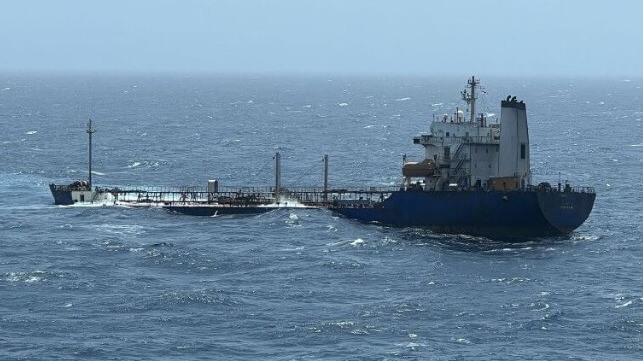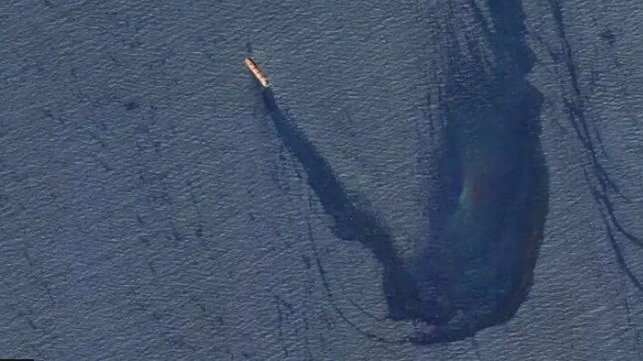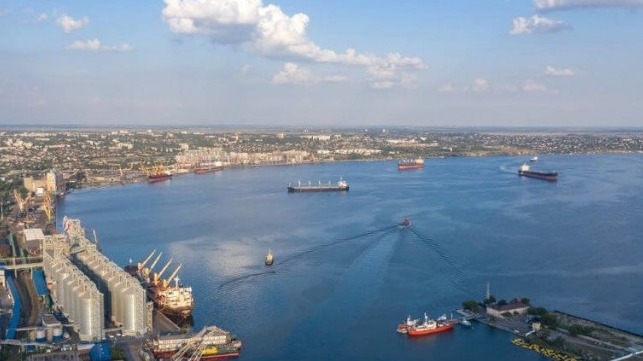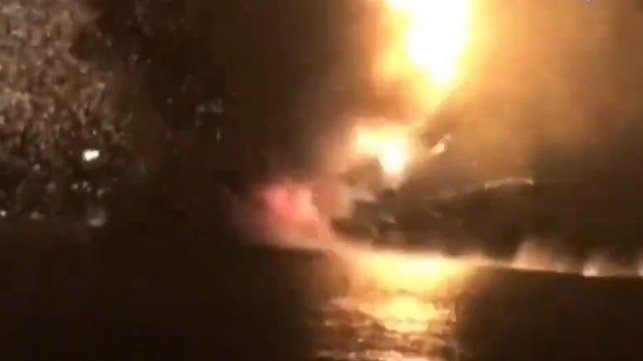WAR IS ECOCIDE
Report: Abandoned Tanker Sinks Off Yemen

The aging tanker Lavant, which sustained uncontrollable flooding off the southeastern coast of Yemen in June, appears to have disappeared and has likely sunk, multiple intelligence sources have confirmed to Reuters. The 30-year-old ship's loss is considered a conventional marine casualty, not one of the many attacks perpetrated by Yemen's Houthi rebel movement.
UKMTO, which first reported the flooding incident aboard Lavant, has not confirmed the vessel's sinking. The organization's last security update for the region was released Sunday.
On the morning of June 22, the Lavant reported uncontrollable flooding at a position about 100 nm southeast of Nishtun, Yemen. The master ordered the crew to abandon ship, and they were rescued by a Gabon-flagged vessel, the ex-Sovcomflot crude oil tanker NS Africa.
Lavant was abandoned and left adrift at 14 31 N 053 08 E, about 130 nautical miles due south of the Yemeni-Omani border. It may have sunk by the end of June, according to previous press reports.
Lavant was a 30-year-old product tanker with an uncertain record. The vessel had no known flag state after January 2023, no known call sign, and no port state inspections after 2017. Its last listed class renewal survey occurred nine years ago, and its last two known flags were the Paris MoU black list registries of Comoros and Tanzania. It was operated by a single-vessel shipmanagement entity with a P.O. box address in Dubai.
According to Russian media reports, Lavant was under way to Somalia when the crew made their distress call.
NS Africa is operated by Dubai firm Stream Ship Management, an entity identified by Ukrainian researchers as a compliance vehicle for semi-sanctioned Russian state shipping firm Sovcomflot. Though Sovcomflot is no longer legally linked to NS Africa after a series of ownership and management transfers, it claimed responsibility for NS Africa's SAR response.
IMO Asks for ROV to Support Cleanup Off Yemen After Rubymar Sank

The International Maritime Organization has gone public with an appeal to the world community inviting in-kind contributions of spill response equipment to support the Republic of Yemen. The organization published an appeal released last week that seeks the donation of a remotely operated underwater vehicle (ROUV or ROV) along with a list of equipment to be used in cleanup efforts.
The call for contributions of oil pollution response equipment the IMO says is to support operations related to the sinking of Rubymar (32,200 dwt) off the coast of Yemen in March 2024. The Belize-flagged vessel was attacked by the Houthis on February 18 and abandoned in the Red Sea. It is believed the Houthis later boarded the disabled vessel to hasten its demise.
During the time the vessel was drifting and slowly taking on water, the U.S. Central Command and others highlighted the growing environmental disaster. The IMO is highlighting that there were 200 tonnes of heavy fuel oil and 80 tonnes of marine diesel on board. In the days following the attack, an oil slick grew behind the vessel reported to reach 18 miles from the wreck.
Another major concern is that the Rubymar was transporting over 41,000 tons of ammonium phosphate-sulfate fertilizer when it was attacked. Environmentalists have emphasized the dangers if it leaks into the Red Sea. The ship went down in about 328 feet (100 meters) of water.
“The ship is currently partially submerged at the location of its sinking, with the remaining bunker fuel and fertilizer cargo onboard representing a significant environmental threat to the Republic of Yemen, in particular to the nearby Hanish Islands, a biologically rich area,” writes the IMO.
Recognizing the lack of specialized oil spill response equipment within the country to respond to a possible leak or other environmental issues, the IMO is inviting in-kind contributions of spill response equipment in support of the Republic of Yemen. In addition to the ROV, they are calling for equipment including a shovelhead skimmer, nozzles used in cleaning efforts, towing brindles, anchoring equipment, and a broad range of personal protective equipment.
The Rubymar was the first vessel confirmed to have sunk due to the Houthi attacks. A second vessel, the Tutor, was also sunk by the Houthi while the vessel was drifting in the Red Sea after an attack. At least two other vessels were badly damaged by fires due to the attacks but are believed to be afloat with reports of salvage efforts. A third vessel, a small tanker, is also being reported as having sank in the Gulf of Aden but this is not being linked to the Houthi but instead, it was an older vessel that reported mechanical problems. A Sovcomflot tanker rescued the crew when they abandoned ship and Reuters is now citing local officials who are saying the ship has disappeared from radar.
The IMO had previously wanted about the severe environmental dangers in the region during the efforts to salvage the FSO Safer. The effort led by the UN successfully moved the oil to another storage tanker but was stopped due to the current conflict before the safer was removed and recycled.
Russian Attack Damages Port Infrastructure in Odesa

Russian forces launched a ballistic missile attack on the Odea port region on Thursday evening, July 4, causing damage and starting at least one fire. The attacks came as Ukraine works to continue to rebuild shipping volumes and after reports of a drone-boat attack on the Russian port of Novorossiysk in the Eastern Black Sea region.
Ukrainian forces reported that one person was killed and seven were injured in the attack on the Odesa port complex. The Ukrainian Air Force said that the attack was directed toward Chornomorsk, one of the key port regions for the country. Port facilities and administrative buildings were damaged as well as reports of damage to housing. There were unconfirmed reports of explosions in the city of Odesa.
Odesa and the port region have come under frequent attacks in the past although there had not been recent reports of damage. On May 1, Russian forces attacked the port region in Odesa and according to Ukrainian media damaged a private postal facility and $76,000 in shipments.
In addition to the attack on the Odesa region, there were widespread reports of Russian drones targeting multiple sites in Ukraine. The Ukrainian Air Force said a total of 22 drones were identified while it claimed to have downed 21 of the attacks.
Yesterday’s attack followed Russian reports that its forces prevented a drone attack on Novorossiysk from causing significant damage. The last round of drone attacks to reach Novorossiysk was on May 17.
Ukraine has been working to expand its shipping operations from the Black Sea ports. The head of the parliamentary finance committee, Danylo Hetmantsev posted data on social media highlighting the growth in activity in the first six months of 2024. He noted that a year ago Ukraine had been hampered by the UN-led initiative which required inspections and permits for ships to enter the region.
Hetmantsev said without the restraints of the UN program and using the corridor established by the Ukrainian military they were able to grow shipments by 68 percent in the first half of 2024 versus 2023. While two-thirds continue to be agricultural products, they were also able to add metal and mining products contributing to the growth and providing critical export income for the country.
The report said a total of six seaports are now active in Ukraine. This spring major carriers MSC Mediterranean Shipping Company, Maersk, and Hapag-Lloyd each restored the container services from the Black Sea ports. Recently, it was reported that Ukrainian ferry service on the Black Sea would also be restored starting this month.
Ukraine Launches Drone-Boat Attack on Novorossiysk

Ukraine launched a drone attack on the port of Novorossiysk on Wednesday morning, the Russian Ministry of Defense has confirmed.
Novorossiysk is a large commercial seaport in the northeastern corner of the Black Sea, about 350 nautical miles away from Ukrainian-controlled coastlines. Over the past year, it has become a safe haven for the Russian Navy's Black Sea Fleet, which has been repeatedly attacked by Ukraine's drone-boat and missile forces. Ukrainian units have destroyed or damaged an estimated 15 Russian ships since the beginning of the invasion in 2022, and the surviving vessels of the Black Sea Fleet have abandoned their home base in Crimea in favor of the relative security of Novorossiysk.
The port is heavily defended with floating barriers, diver-detection units (dolphin pens), helicopter gunships and shore batteries. Despite these defenses, Ukraine continues to attack it with its long-range unmanned drone boats - the same devices it has used with success against Russian warships in the past.
In a statement, the Russian Ministry of Defense said that its forces spotted and destroyed two Ukrainian drone boats as they approached Novorossiysk in the early hours of Wednesday morning. The reported damage was limited to light impacts to two buildings, according to local mayor Andrei Kravchenko.
As a precaution, Kravchenko shut down access to a waterfront embankment and issued an air-raid warning. Authorities advised local residents to take shelter in a room facing away from the sea, and to stay away from windows.
Ukraine has not claimed responsibility for the attack, nor reported any damage inflicted on Russian assets.
The last round of drone attacks to reach Novorossiysk was on May 17, part of a massive wave of an estimated 100 aerial and surface drones launched at Russian targets across the front.
No comments:
Post a Comment